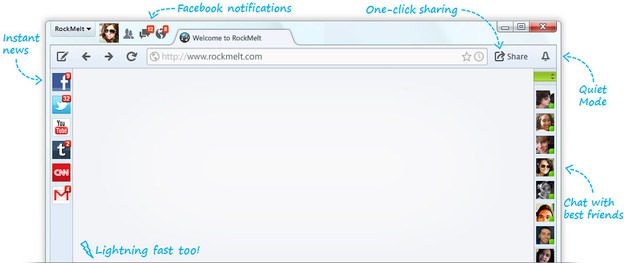Rockmelt 0.8.36.116 displaying Wikipedia on Windows 7 | |
| Developer(s) | Tim Howes, Eric Vishria |
|---|---|
| Final release | |
| Engine | WebKit (based on KHTML) |
| Operating system | Android, iOS, Windows |
| Type | |
| License | Freeware[1] |
| Website | rockmelt.com[dead link] |
If this is also your case, then you're sure to like RockMelt, a Chrome-based browser that includes special controls to have our friends present at all times. The browser includes a chat bar where we can talk to our friends, controls to update our status and a bar where we can add social networks and temporary personalized lines. Rockmelt is a social web browser built off of Chromium and boasts deep integration with both Facebook and Twitter with its 'Edges' which are filled with friends that are online and feeds that you follow complete with update badges. It also sports what some believe to be the next big search revolution.
RockMelt is built on the same Chromium core as Google's browser, but adds a host of social networking, news feed and search features that elevate it above Chrome. RockMelt is feature rich and fast. The browser is Chromium based and therefore is packed with useful tools and functionality. It offers a fresh and more instinctive social web experience for the user, due to its powerful social networking integration. The advantage of choosing RockMelt is that it can be customized to suit the specific browsing needs of the user.
Rockmelt is a discontinued proprietary social mediaweb browser developed by Tim Howes and Eric Vishria based on the GoogleChromium project, incorporating social media features such as Facebook chat, Twitter notifications and widgetised areas for other content providers such as YouTube and local newspapers. The Rockmelt web browser project was backed by Netscape founder Marc Andreessen.[2] As of April 2013, Rockmelt discontinued its desktop web browser, replacing it with a collaborative project bringing together social elements from various sources.[3]
Rockmelt was created by Rockmelt, Inc., located in Mountain View, California.[4] The final version, 2.2.0, was released on February 9, 2013.
On August 2, 2013, Yahoo! acquired Rockmelt. Rockmelt apps and the website were shut down after August 31, 2013. Yahoo! plans to integrate Rockmelt’s technology throughout various products.[5]
Rockmelt Browser For Mac
History[edit]
- November 7, 2010 - Rockmelt for PC and Mac launches in private beta [6]
- March 11, 2011 - Rockmelt for PC and Mac launches in open beta [7]
- April 19, 2011 - Rockmelt for iPhone launches [8]
- October 11, 2012 - Rockmelt for iPad launches [9]
- December 20, 2012 - a new Rockmelt for iPhone launches [10]
- April 11, 2013 - Rockmelt for Web launches [11]
- June 19, 2013 - Rockmelt for Android launches [12]
- June 27, 2013 - Rockmelt for Windows launches [13]
- August 2, 2013 - Rockmelt is acquired by Yahoo[5]
- August 31, 2013 - Rockmelt mobile applications pulled off of web[5]
Reception[edit]
Rockmelt was positively received by Tom’s Guide, though they noticed that the RAM consumption was higher than Chrome or Firefox. The browser's “Edges” were called “the three most prominent features of the RockMelt browser”.[14]
Rockmelt Browser
Notebook Review, while comparing Rockmelt to Flock, gave Rockmelt 4.5 stars out of 5, with the absence of extension support being the most noticeable issue with the browser. “The social networking integration is worlds better than Flock’s, and ... there are at least some very useful features that RockMelt leverages. The news feed really is well done, and the Facebook handling is certainly better than Flock.”[15]
In a beta preview by Techcrunch, Rockmelt received mixed reviews mostly due to the browser using Chromium as its base, with a number of concerns whether the browser would find its audience.[16]
In a short review by PCWorld, Megan Geuss stressed the overall Facebook integration of the browsers, which would not work for every user, while also praising the performance of Rockmelt: “the fledgling browser works really quickly. It did an even better job than Chrome at processing HTML5”.[17]
A PCMech review of Rockmelt stressed how easy it was to share content via Rockmelt, and the browser received praises for the option to add additional feeds. “It is easier than manually going to Twitter or Facebook and is most certainly easier when managing feeds for the web sites you visit often. On top of that, it looks good.”[18]
References[edit]
- ^'Rockmelt Terms of Service'. 2011-12-13. Archived from the original on 2012-09-08.
- ^Helft, Miguel (2009-08-13). 'Netscape Founder Backs New Browser'. The New York Times.
- ^Ong, Josh (11 April 2013). 'Rockmelt Abandons Social Browser, Launches New Web Feed and iPhone App'. thenextweb.com. Retrieved 5 July 2016.
- ^Facebook community page showing Rockmelt, Inc.'s headquarters
- ^ abcGeron, Tomio. 'Yahoo Acquires Rockmelt Social Browser, Will Shut Down Apps'. Forbes.
- ^'World, Meet Rockmelt'. Rockmelt blog. Rockmelt. 2010-11-07. Archived from the original on 2010-11-08. Retrieved 2010-11-09.
- ^'No more waiting in line — RockMelt now in Open Beta!'. 2010-03-11. Archived from the original on 2012-12-02.
- ^Geron, Tomio (2011-04-19). 'Rockmelt's New Mobile Browser--A New Mobile Home Screen?'. Forbes.
- ^Levy, Steven (2012-10-11). 'Rockmelt Thinks You're Ready for a Modern Mobile Browser'. Wired.
- ^'Rockmelt finally brings its deconstructed browser to the device I wanted it on back in October: My iPhone'. 2012-12-20.
- ^Copeland, Michael V. (2013-11-04). 'Marc Andreessen and Rockmelt Are Betting the Desktop Has a Future'. Wired.
- ^'Rockmelt brings the Best of the Internet to Android'. 2013-06-19.
- ^'Microsoft showcases developer opportunity on Windows Azure, Windows devices'. 2013-06-27. Archived from the original on 2013-07-31. Retrieved 2013-07-30.
- ^'RockMelt Browser Guide'. Tom’s Guide. November 15, 2010. Retrieved 18 November 2015.
- ^'RockMelt Social Browser Review'. Notebook Reviews. December 28, 2010. Retrieved 18 November 2015.
- ^'Between A RockMelt And A Hard Place: The Quest For The Social Browser'. Techcrunch. November 11, 2010. Retrieved 18 November 2015.
- ^'RockMelt Browser a Swift Choice for Social Media Junkies'. PCWorld. November 12, 2011. Retrieved 18 November 2015.
- ^'RockMelt Browser Review'. PCWorld. November 18, 2010. Retrieved 18 November 2015.
RockMelt is a new web browser that integrates with Facebook so that every page can be quickly shared and every post from a friend discovered.
RockMelt is built using Chromium, which is the open-source web browser project that underlies Chrome; so it performs almost as well as the speedy browser that Google built. To this foundation, RockMelt adds a nifty Facebook integration that makes it easy to track friends or share.
Internet Browser Pedigree

RockMelt has a pretty strong pedigree. The browser’s founders include Marc Andreesen, who co-founded Netscape, Ben Horowitz, Tim Howes, and Eric Vishria, who all have Internet and browser experience. The company is also said to be well funded with principle investments coming from the venture capital firm Andreesen Horowitz—yes the same Andreesen and Horowitz.
Facebook Features
RockMelt’s key feature is the way it wraps Facebook around the main browsing area.
First, every user must login to Facebook before opening RockMelt. Once logged in, the RockMelt user’s profile and friends show up on the Facebook edge. Clicking on your profile picture makes it possible to quickly post to Facebook.
Post to Facebook directly from the RockMelt browser.

It is also fairly easy to see a friend’s recent posts by clicking on a profile picture.
Seeing recent activity from a particular friend may be easier in RockMelt than on Facebook proper.
You can chat from this same window, or chat in a pop-out window that is, frankly, more visually appealing than the Facebook interface, which is still available when you are visiting the Facebook site.
Seeing recent activity from a particular friend may be easier in RockMelt than on Facebook proper.
Sharing from RockMelt
To share a page from RockMelt, just click the “Share” button at the top, center of the browser. Select either Facebook or Twitter, and share away.

Sharing to a Facebook Wall or Twitter stream is done directly from RockMelt.
Apps and RSS Feeds
In RockMelt, the right-hand edge is for applications and RSS feeds. At present, I could only find applications for Facebook and Twitter, but adding an RSS feed also makes it possible to use RockMelt as a reader.
Rockmelt Browser Mac
From a social marketing perspective, this could come in handy since it is often a good idea to use RSS feeds as a way of finding interesting and relevant content to post.
The 'App Edge' helps track Faceboo, Twitter, and RSS feeds.
Reading a Twitter stream or feed is very easy in RockMelt.
Integrated Search Previews
RockMelt also allows users to preview search results directly from the browser. For example, typing “ecommerce webinar” into the search bar and pressing enter, displays the results in a narrow row, without ads and without taking the user to Google to see the results.
Rockmelt Browser Downloads
RockMelt offers a search preview that excludes ads, at least for now.
There Is a Lot Missing
Within a few minutes of using RockMelt, I had discovered plenty of features that it did not have, but that I wish it did have.
Google Chrome Download
First and foremost, I could not find a way to use the RockMelt interface to post to the Facebook pages I manage. This deficiency means that I probably wouldn’t use the browser specifically for social marketing purposes.
Next, the Twitter integration, while functional, seemed like an afterthought. Finally, I could not figure out how to add apps for other social media sites like LinkedIn, Yahoo! Meme, FourSquare, or Yelp.
